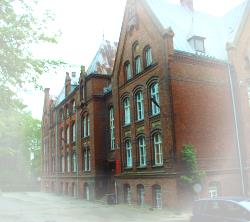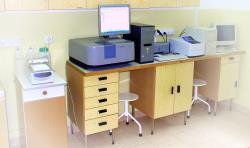 | |
| Fig 1. - Microbiology Department at The Medical University of Gdansk. | |
The National Salmonella Centre provides national reference service and research for Salmonella bacteria in Poland.
The basic investigations of human Salmonella infections and Salmonella-contaminated food are carried out by routine diagnostic laboratories: regional sanitary-epidemiological
 | |
| Fig. 2 - Laboratory of molecular microbiology. | |
The National Salmonella Centre activities:
- Reference diagnostics of Salmonella strains for health and veterinary local laboratories. Suspect Salmonella cultures difficult for field-level identification are submitted to the National Salmonella Centre. The reference diagnostic investigations have been carried on by our laboratory since 1946.
- Identification and determination of Salmonella serovars isolated for the first time in Poland. According to the National Salmonella Centre data, 204 Salmonella serovars have been determined in Poland and first occurring serovars are still isolated. Antigenic definition of each first isolated serovar is confirmed by the WHO Collaborating Centre for Reference and Research on Salmonella (Institut Pasteur, Paris, France). Based on our investigation results, the scheme of Salmonella serovars isolated in Poland has been done. The scheme worked out according to the Kauffmann-White scheme is prepared for the field laboratories use. Our Centre receives each new edition of the "Antigenic formulas of the Salmonella serovars" from the WHO Collaborating Centre for Reference and Research on Salmonella.
- Phage typing for five Salmonella serovars: S. Typhi (from 1956), S. Paratyphi B (from 1958), S. Paratyphi A (from 1962), S. Typhimurium (from 1965). The bacteriophage preparations are received from the Central Public Health Laboratory (Colindale, London, UK). As a member of the International Federation for Enteric Phage Typing (IFEPT) we are obliged to report our results of bacteriophage typing. The general world reports of the geographical distribution of S. Typhi, S. Paratyphi A and S. Paratyphi B phage types are presented on the International Congresses of Microbiology (by Mrs L.R. Ward - the IFEPT Secretary). The S. Enteritidis strains have been typed since 1972 according to the Lalko scheme. In 1996 we started the typing of S. Enteritidis strains with Colindale phage preparations. Phage typing of S. Enteritidis and S. Typhimurium is also performed by the National Institute of Hygiene in War saw.
- Serodiagnosis (Widal test) of infection with: S. Typhi, S. Paratyphi A, S. Paratyphi B and S. Paratyphi C.
- Training in serotyping and phage-typing techniques for staff from fields laboratories.
- National Salmonella Centre performs the control of the sera for the Salmonella serological identification produced by biotechnological companies in Poland.
- We provide advise and collaborate with health and veterinary institutions in Poland.
- Scientific co-operation is held with different research institutions (e.g., University of Gdansk, Intercollegiate Faculty of Biotechnology UC-MUG, Centre of Excellence in Bio-safety and Molecular Biomedicine BioMoBiL).
- We have been engaged in the Global Salmonella Surveillance Program performed by World Health Organization since 1957.
- Since 2001, we have been taking part in the External Quality Assurance System (EQAS) organized by Danish Veterinary Institute in collaboration with WHO Headquarter in Geneva, Institut Pasteur and Centres for Disease Control in Atlanta. The EQAS program is an international collaborative study on serotyping and antimicrobial susceptibility testing of Salmonella enterica strains.
- National Salmonella Centre maintains the collection of about 2000 bacteria strains - Collection of Salmonella Microrganisms (acronym KOS). The strains mainly belong to the Salmonella genus. Collection includes the cultures of special serological and biochemical properties coming from the medical and veterinary laboratories from all over the country. A limited number of cultures have been obtained from other collections. KOS Collection is a member of the European Culture Collections' Organization (ECCO) and the World Federation for Culture Collections (WFCC). The Collection offers material for comparative taxonomical studies to research workers, local health laboratories, students, industrial laboratories and to other institutions.
Copyright © 2005-2011 Medical University of Gdańsk


